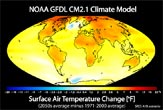Why Americans are Skeptical of Their Role in Global Warming

Get the world’s most fascinating discoveries delivered straight to your inbox.
You are now subscribed
Your newsletter sign-up was successful
Want to add more newsletters?

Delivered Daily
Daily Newsletter
Sign up for the latest discoveries, groundbreaking research and fascinating breakthroughs that impact you and the wider world direct to your inbox.

Once a week
Life's Little Mysteries
Feed your curiosity with an exclusive mystery every week, solved with science and delivered direct to your inbox before it's seen anywhere else.

Once a week
How It Works
Sign up to our free science & technology newsletter for your weekly fix of fascinating articles, quick quizzes, amazing images, and more

Delivered daily
Space.com Newsletter
Breaking space news, the latest updates on rocket launches, skywatching events and more!

Once a month
Watch This Space
Sign up to our monthly entertainment newsletter to keep up with all our coverage of the latest sci-fi and space movies, tv shows, games and books.

Once a week
Night Sky This Week
Discover this week's must-see night sky events, moon phases, and stunning astrophotos. Sign up for our skywatching newsletter and explore the universe with us!
Join the club
Get full access to premium articles, exclusive features and a growing list of member rewards.
SAN FRANCISCO—While the evidence is clear that human-caused global warming is occurring and is a threat to many humans and other organisms on the planet, many Americans have been slow to buy the whole argument.
Yesterday at its annual meeting here, the American Association for the Advancement of Science, the largest science organization in the world, issued a consensus statement that "global climate change caused by human activities is occurring now and is a growing threat to society,'' Earlier this month the Intergovernmental Panel in Climate Change issued a statement that global warming will "continue for centuries" and is "very likely caused by man."
While these statement may have changed public opinion in recent weeks, last year a joint poll between ABC News, Time, Stanford University and Ohio State University found that only 3 in 10 Americans believed that global warming is caused by humans. Less than 40 percent of the nation’s public called global warming is an immediate and serious problem.
"Americans are very much on the same wavelength with the scientific community about the basics of the issue," Jon Krosnick, professor of communication and of political science from Stanford University said during a talk here yesterday. "But they lack certainty" about how bad the problem really is.
- Surprising Results of Global Warming
- Emerging Environmental Technologies
- Video: Goldilocks and the Greenhouse
The belief model
Amid the public uncertainty, data continues to pile up. The average global temperature last month was the highest for any January on record. Last year was a record warm year in the United States. The past nine years are all among the 25 warmest on record for the contiguous United States, a streak unprecedented in records dating back to 1896. Scientists say 2007 could be the warmest yet globally.
But there is a disconnect between what scientists know and what the public believes. In order for Americans to embrace an issue like climate change as a nationally serious concern, they first have to believe that the problem exists and that the results would be bad for people, Krosnick said.
Get the world’s most fascinating discoveries delivered straight to your inbox.
“Most Americans believe that,” Krosnick said. However, they also have to be highly certain about the problem. “Only 7 percent are extremely sure of their views about climate change, another 25 percent are very sure and 41 percent only somewhat sure,” Krosnick said. “So there’s lots of room for potential increase in certainty.”
Krosnick's research finds scientists are frustrated. "They've been sounding alarm bells for over a decade, saying, ‘We have a really serious problem with the environment and we're destined for a train wreck down the road. How come nobody is listening?'"
Many scientists assume that the public doesn't understand or accept their work.
"That is wrong," Krosnick said. Most Americans believe the world has been heating up, probably as a result of human activity, and that this will be bad for people, he said. But because people lack absolute certainty, global warming does not arouse a constantly heightened level of public concern.
Additionally, Americans believe that unless they caused the problem, they should not interfere with what’s happening with the climate.
“So in other words, if Mother Nature is doing her thing, then we cope with it and don’t try to manipulate it,” Krosnick said “But if we damage nature then it’s our responsibility to undo it and it is, in fact, a national problem.”
Only 42 percent of Americans blamed climate change on people in last year's poll, Krosnick said.
And lastly, people aren’t willing to acknowledge something is a problem unless it can be fixed, because otherwise it’s just too upsetting.
Media's role
The role of scientists and media is not to be forgotten in affecting public opinion, Krosnick said. Good scientists always leave room for potential mistakes and doubt when reporting their work, but communicating their natural uncertainty can cause reservation in the public mind.
“When we ask people, 'Do you think scientific experts that study the climate mostly agree that the climate is heating up or do you think that there is a lot of disagreement,' 64 percent of Americans said that there is disagreement in the scientific community,” Krosnick said.
This false belief, Krosnick explained, seems to be tied to the efforts of the news media to tell a balanced story.
“Many of the stories have not only the mainstream scientific opinion on climate change but they also have some attention to the skeptics—four people, I guess, that make a good living doing this—and the skeptical point of view has more prominence in the media than it does in the scientific literature,” Krosnick said. “And that’s what’s contributing very importantly to this belief.”
More to Explore
- Surprising Results of Global Warming
- Emerging Environmental Technologies
- The History of Climate Change Science
- Video: Goldilocks and the Greenhouse
- How You Can Fight Global Warming
- Blog: Finally, the End of the Argument
Global Warming Features
- Earth Will Survive Global Warming, But Will We?
- Strange Weather's Loose Link to Global Warming
- Global Warming or Just Hot Air? A Dozen Different Views
- Serious Climate Change: Winds Blew in Reverse During Last Ice Age
Recent Climate Change News
- Warm Global Temperatures Set Record Last Month
- World's Largest Science Group Chimes in on Climate Change
- Global Warming Wakes Groundhogs Earlier
- 113 Nations Agree ... Climate Change 'Very Likely' Caused by Humans
- Carbon Offsets: The Trendy Climate Thing to Do
Hot Topic
What makes Earth habitable? This LiveScience original video explores the science of global warming and explains how, for now, conditions here are just right.
The Controversy
- World's Largest Science Group Chimes in on Climate Change
- 113 Nations Agree ... Climate Change 'Very Likely' Caused by Humans
- White House Accused of Misleading Public on Global Warming
- Global Warming or Just Hot Air? A Dozen Different Views
- Report: Global Warming's Smoking Gun is on the Table
- Global Warming Differences Resolved
- Baffled Scientists Say Less Sunlight Reaching Earth
- Scientists Clueless over Sun's Effect on Earth
- Greenhouse Gas Hits Record High
- Key Argument for Global Warming Critics Evaporates
The Effects
- Seas Rise
- More Wildfires
- Deserts to Grow
- Greenland Melts
- Mountains Grow
- Ground Collapses
- Glaciers Disappear
- Allergies Get Worse
- Summer Gets Longer
- Animal DNA Changing
- Animals Change Behavior
- Rivers Melt Sooner in Spring
- Increased Plant Production
- Hurricanes Get Stronger
- Some Trees Benefit
- Lakes Disappear
The Possibilities
- More Rain but Less Water
- Ice-Free Arctic Summers
- Overwhelmed Storm Drains
- Worst Mass Extinction Ever
- A Chilled Planet
Strange Solutions
 Live Science Plus
Live Science Plus






